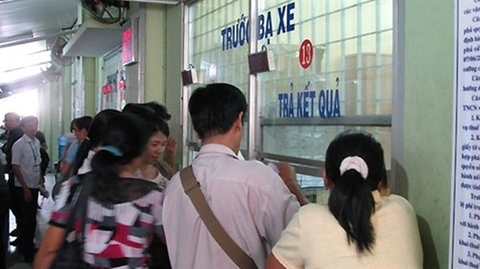
People pay registration fees for cars at Ha Noi Police Office. — Photo nguoiduatin.vn
The European Chamber of Commerce in Viet Nam (EuroCham) proposed the Government to apply the 50 per cent registration fee reduction to all automotive assembly firms, importers and dealers of new vehicles.
The proposal was part of recommendations at the EuroCham’s 12th Whitebook publication, which was announced on Tuesday. It was issued after the Vietnamese Government recently decided to apply the 50 per cent fee reduction for buyers of locally-manufactured and -assembled vehicles until the end of this year.
The cut aims to stimulate domestic consumption and remove difficulties for local production and business due to the impacts of the COVID-19 pandemic.
Currently, buyers of cars with less than nine seats in Viet Nam are subject to a 10 per cent registration fee, or 12 per cent for residents of Ha Noi.
“With the Prime Minister’s decision to reduce the registration fee, buyers of domestically-manufactured and -assembled vehicles will only have to pay a fee of 5-6 per cent. Those who buy cars imported from abroad still have to pay registration fees of 10-12 per cent depending on the locality,” EuroCham said in the book.
For domestic car joint ventures, only two European brands – Mercedes and Peugeot – out of 19 imported in Viet Nam will benefit for their locally assembled models.
EuroCham said stimulating consumption in the automotive market is necessary as customers struggle to maintain their activities. Furthermore, it will take time for supply chain disruption to be resolved.
“Such discrimination in favour of locally assembled vehicles is not casting the intended positive light for Viet Nam with the European Union when the EVFTA is expected to enter into force soon,” EuroCham said.
EuroCham also recommended a 50 per cent reduction of Value Added Tax and of excise tax.
Due to the impact of COVID-19, 2020 is now proving to be an extremely challenging year for the whole automotive industry worldwide. The full supply chain for new vehicles and spare parts is disrupted.
Automakers in the EU, the US and Viet Nam have had to suspend operations – manufacturing, distribution and retail – for about a month in April to comply with social distancing regulations of the Government.
Despite social distancing being revoked in May, the sales in 2020 were still far below expectation. On April 28, Fitch Rating’s forecast a 21.8 per cent drop in new cars sales in Viet Nam for the full year 2020.
According to Vietnam Automobile Manufacturers' Association, sales hit a five-year low, dropping 36 per cent year-on-year to about 61,000 vehicles in the first four months of 2020. After-sales service has, so far, decreased by 30-40 per cent.
EuroCham said that bonded warehouses are not allowed to import complete-built-up (CBU) vehicles cars for sale in Viet Nam. CBU importers must pay all taxes, including import tax, special consumption tax and value-added tax at customs clearance immediately. Car sales in Viet Nam are now very low.
“The market will take time to recover as customers need to ensure their own financial safety. Still, costs such as real estate rental and labour did not fall. Cash is scarce both at importers and dealers and will remain so until a global recovery in the supply chain and the market,” EuroCham noted.
For the automotive industry to maintain jobs and operations until post-COVID-19 recovery, EuroCham recommended the Ministry of Finance exceptionally re-allows partial clearance at customs by re-authorising bonded warehouses for new CBU imported vehicles until December 2020.
“Such a customs clearance extension should provide the necessary time for importers to recover financially to pay taxes gradually as they sell their stock and as the economy recovers.”
Viet Nam’s automobile market exceeded a record 400,000 new vehicles – 302,000 passenger cars and 80,000 commercial vehicles – in 2019. Of these, 70 per cent were locally assembled units and 30 per cent imported cars. — VNS